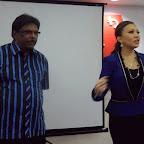Tuesday 10 December 2013
Thursday 28 November 2013
We are a vibrant and dynamic training provider to Corporate and Government organisations. We are registered with the Ministry of Finance (MOF) and Human Resource Development Fund (HRDF). All our training programmes and courses are claimable from HRDF under the SBL scheme.
Our critical mission is to assist our clients to develop and prepare their staff to meet future challenges and deliver superior performance at the workplace, through effective public and in-house training courses and programmes.
We provide training courses and programmes in the following categories:
- English Language and Communication Skills
- Development Programmes for Staff, Clerical, Executive and Managers
- HR Related Courses
- IT Skills
- Technical Skills
We are happy to discuss your training needs and customise our courses for you. You may contact us through our training consultant - Development Programmes for Staff, Clerical, Executive and Managers
- HR Related Courses
- IT Skills
- Technical Skills
Siti Aishah 012-8919855
aishah@tripleAtraining.com
Upcoming Public Programmes in 2014
Pengurusan Dokumen
Kuala Lumpur, 10 Feb
Managing Absenteeism
Kuala Lumpur , 11 Feb
Penulisan Surat Rasmi
Kuala Lumpur, 7 Apr
Domestic Inquiry
Kuala Lumpur, 8 Apr
Kursus Menyelesaikan Masalah
Kuala Lumpur, 9 June
Kursus Pengucapan Awam
Kuala Lumpur, 11 Aug
Supervisory Skills
Kuala Lumpur, 12 Aug
Oh My English
Kuala Lumpur, 13 Oct
Accounting Skills
Kuala Lumpur, 14 Oct
Blue Ocean Strategies
Kuala Lumpur, 3 & 4 Dec
For info on our public programmes and more, please contact our training consultant
Siti Aishah 012-8919855
aishah@tripleAtraining.com
Wednesday 9 October 2013
Ucapan Penamat Kursus Pengucapan Awam Oleh Sidek
Ucapan penamat daripada peserta Kursus Pengucapan Awam yang telah diadakan pada 7 Oktober 2013. Peserta ini telah dilatih oleh Azmi Shahrin
Tuesday 17 September 2013
Managing Employee Absenteeism (1-Day Public Seminar)
Introduction
Employee absenteeism is a critical
problem affecting all Malaysian companies and organisations. Employees make a
lot of excuses and cheat to be absent. As a result, employers lose a lot of
money when staff morale and productivity is greatly reduced. This is the reason
why it is important for employers to keep their employees at work.
Therefore, there is an urgent need
for HR executives and managers to fully understand the reasons for absenteeism
and learn strategies to manage it in order to improve productivity and maintain
staff discipline. However, many of them are unable to manage the problem
effectively and need expert advice.
This seminar assists participants to
manage absenteeism by providing extensive examples and case studies from
companies which have successfully managed this problem.
At the end of the programme, participants will
- Understand
the causes of absenteeism
- Apply
absence management strategies- Manage
disciplinary procedures
- Learn
how other companies deal with absenteeism
- Understand
the law on absenteeism
- Manage
Employee Absenteeism
Seminar Leader
This
seminar will be led by Puan Mazibah Mohd Zin, an experienced master trainer who
has conducted numerous public and corporate training programmes on HR and
Customer Service topics. She obtained her Bachelor of Science degree majoring
in Management and Organizational Behaviour from Oregon State University, USA
and Master of Business Administration degree with Advanced Certificate in
Personnel Administration and Decision Support System from New Hampshire
College, Manchester, USA.
Programme Outline
Modules
Meaning of Absenteeism
Section
15(2) of the Employment Act 1955 | Absence Without Leave & Abandonment of
Service | Misconduct & Burden of Proof
Other Forms of Absenteeism
Excessive
Medical Leave | Tardiness At Workplace
Understanding the Causes of Absenteeism
Ability/Boredom/Routine
| Stress | Motivation Issues | Medical Disorder | Peer Pressure | Work
Conditions
Remedies to Absenteeism
Procedures
& Policies | Sick Leave Management | Reward & Recognition Programme | Buddy
System | Team-Based Responsibilities | Sense of Belonging |
Improving
Work Conditions
Disciplinary Procedure to Address Absenteeism
Drafting
Charges | Initial Counselling | Show Cause & Warning Letters | Domestic
Inquiry | Termination
Schedule
|
Date
|
Venue
|
Early
Bird Deadline
|
|
7 Oct
2013
|
Shah
Hotel, Petaling Jaya
|
25
Sept 2013
|
|
12 Nov
2013
|
Hotel
Seri Malaysia, Penang
|
25 Oct
2013
|
|
18 Nov
2013
|
Hotel
Seri Malaysia, Ipoh
|
31 Oct
2013
|
|
26 Nov
2013
|
Hotel
Seri Malaysia, Kuantan
|
7 Nov
2013
|
|
2 Dec
2013
|
Hotel
Seri Malaysia, Melaka
|
14 Nov
2013
|
|
10 Dec
2013
|
Hotel
Seri Malaysia, JB
|
21 Nov
2013
|
|
17 Dec
2013
|
Hotel
Seri Malaysia, Kuching
|
30 Nov
2013
|
Registration Fee
RM800
per Pax | RM2100
per Group of 3 Pax
Early Bird (Pay By Deadline)
RM700
per Pax | RM2000
per Group of 3 Pax
Payment Method
Cheque/Bank
Draft payable to
TRIPLE A
TRAINING
MBB:
5623 6663 2488
Conditions
No
refunds are allowed except for delegate substitution
Reservation
The
organiser reserves the right to return any funds paid or change the training
date and venue with due notice
To
Register or Enquire, Please Contact
Aishah
012-8919855
Sunday 15 September 2013
Upcoming Public Programs 2024 | Jadual Kursus Awam 2024
The timetable above are subject to changes. To enquire or reservation, please contact Encik Shahrizul Amizan at 011-25085983 or email to shahrizul93@gmail.com for full brochure / proposal.
Jadual diatas tertakluk kepada perubahan. Untuk sebarang pertanyaan atau tempahan, sila hubungi Encik Shahrizul Amizan di talian 011-25085983 atau emel di alamat shahrizul93@gmail.com untuk brochure / proposal yang lengkap.
Wednesday 3 July 2013
The English Express II™ Intermediate English Programme
This is a 2-day intensive programme for government and corporate employees employees who require intermediate English language skills. It is the second part of the 3-part The English Express™ English Programmes.
Many participants have poor command of the English language because they have English phobia. Their fear of the English language, trap them in a negative reinforcing cycle that offers no way out.
However, this course helps participants to overcome their fear of the English Language by encouraging them to use the language. By overcoming their fear, participants will begin a new positive reinforcing cycle which will put them on a path which will encourage them to continuously acquire new language skills.
The first major step to overcome the fear is to begin speaking in English regardless of grammatical, pronunciation and vocabulary mistakes.
In The English Express I™, the participants learned to overcome the fear of the English language by making a commitment to use English boldly. In the current programme, they will take another step in this direction. They will learn more advanced grammar and practise speaking in various situations. At the end of the programme, the participants will be able to communicate confidently in English with an improved grasp on the grammar.
This programme employs adult learning techniques which include active learning strategies to facilitate understanding and retention. Participants will spend 80% of the time in individual or group activities which allow them to learn, develop and practise English language skills. A pre-test and a post-test (on grammar) are administered to gauge the participants’ retention. A simple workbook is used to facilitate the programme. The number of participants is limited to 15 to ensure personal attention for each participant.
Module 1
- Present Perfect Tense – usage of the verb in the present perfect form e.g. I have visited Singapore.
Module 2
- Interacting with Customers – common words and phrases to use in conversation with customers
Module 3
- Present Perfect Continuous Tense – usage of the verb in the present perfect continuous form e.g. I have been dating Angela since 2008.
Module 4
- Pronunciation – plosive sounds, the schwa, correcting common errors
Module 5
- Past Perfect Tense – usage of the verb in the past perfect form e.g. Ali told me that he had eaten.
Module 6
- In the Office – common words and phrases to use in office conversations
Module 7
- Past Perfect Continuous Tense – usage of the verb in the past perfect continuous form e.g. You had been waiting there for more than two hours when she finally arrived.
Module 8
- Writing Exercise - Letter responding to customer complaint / An email request and responding to an email request
The English Express I™ Basic English Programme
This programme employs adult learning techniques which include active learning strategies to facilitate understanding and retention. Participants will spend 80% of the time in individual or group activities which allow them to learn, develop and practise English language skills. A pre-test and a post-test (on grammar) are administered to gauge the participants’ retention. A simple workbook is used to facilitate the programme.
Module 1
- Overcoming the Fear of the English Language – commitment & promise
Module 2
- Stand Up and Speak – taking the first step
Module 3
- Subject-Verb Agreement – the fundamental rule of English grammar – matching singular verb to singular
- Noun and plural verb to plural noun. For example, Ali drives to office every morning, Ali and Mira drive to office every morning.
Module 4
- In the Office – common words and useful phrases to use in office conversations, meetings and presentations
Module 5
- Simple Present & Present Continuous Tense – the use of the simple present tense to describe a truth or a habitual action. For example, Ali brushes his teeth every morning.
- The use of the present continuous tense to describe a current action. For example, Ali is brushing his teeth now.
Module 6
- Simple Past & Past Continuous Tense – the use of the simple past tense to describe a past action. For example, Mila drove to work yesterday.
- The use of past continuous tense to describe an action that was happening at a specific time in the past. For example, Mila was watching TV at 10 p.m. yesterday.
Module 7
- Telephone Conversation Skills - common words and useful phrases to use in telephone conversations
Module 8
- Interacting with Customers – common words and phrases to use in conversation with customers
Subscribe to:
Posts (Atom)













